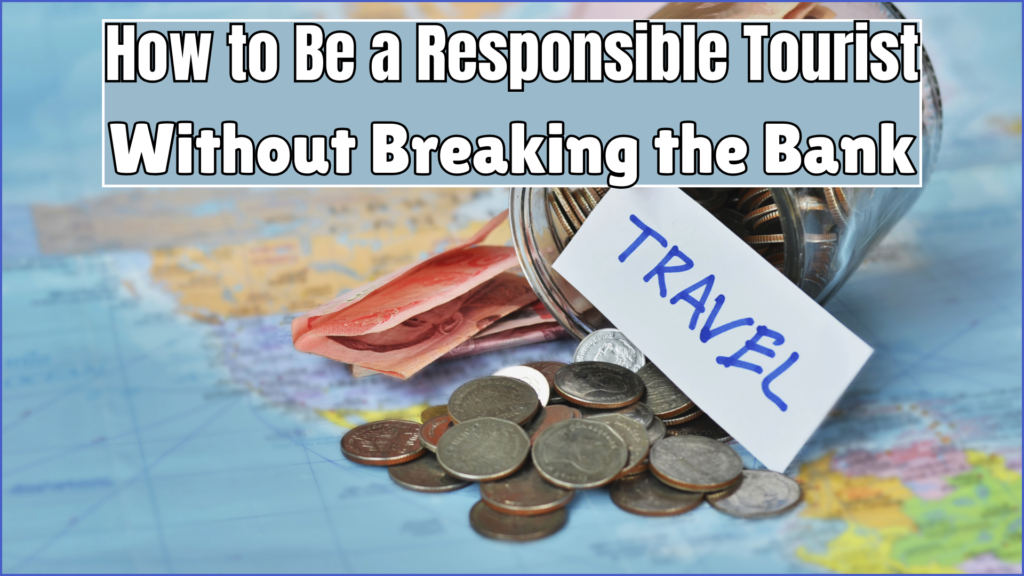Traveling offers a window to the world, and an opportunity to explore diverse cultures, landscapes, and histories. However, as tourism expands, so does its environmental and cultural footprint. Being a responsible tourist is more than just a buzzword; it’s a commitment to respecting the places you visit while minimizing negative impacts. But what if you’re on a tight budget? Is it still possible to be a responsible traveler without overspending? Absolutely. Many practices that make travel more sustainable can also be more economical. This article delves into ten essential tips that will help you be a responsible tourist on a budget, proving that conscientious travel doesn’t have to come with a hefty price tag.
The Best 10 Must-Know Tips for Being a Responsible Tourist on a Budget
1. Research Your Destination Thoroughly

Being an informed traveler is the first step towards responsible tourism. Before you set foot in a new destination, spend time researching its culture, customs, and environmental issues. Understanding local traditions helps you avoid actions that might be considered disrespectful, such as inappropriate dress or behavior in sacred sites. Moreover, knowing the environmental challenges faced by the region can guide you in making eco-friendly choices, such as avoiding single-use plastics in areas where waste management is a problem.
Budget Tip: Use free online resources like travel blogs, YouTube channels, and cultural websites to gather information. Libraries and eBooks can also offer in-depth knowledge without incurring extra costs.
Protect your travels with comprehensive medical insurance. Click here to secure your policy today and travel with peace of mind!
2. Choose Sustainable Accommodation
Accommodation can be one of the biggest expenses on a trip, but it’s also an area where you can make a significant positive impact. Opt for eco-friendly accommodations that prioritize sustainability. Look for hotels, hostels, or Airbnb listings that have green certifications, use renewable energy, support local communities, or have strong environmental policies. Some establishments may even offer discounts or incentives for guests who choose to reduce their carbon footprint, such as by skipping housekeeping services or participating in recycling programs.
Budget Tip: Consider staying in locally-owned guesthouses or hostels. These are often more affordable than international hotel chains and have a smaller environmental footprint. Camping or homestays can also be budget-friendly, sustainable options.
3. Support Local Businesses
One of the best ways to be a responsible tourist is to support the local economy of the places you visit. This means eating at locally-owned restaurants, shopping at markets instead of chain stores, and using local guides for tours. By spending your money locally, you’re helping to sustain jobs and boost the community’s economy. Furthermore, local businesses often offer more authentic experiences and products, giving you a deeper insight into the culture.
Budget Tip: Street food, local markets, and family-run eateries are often cheaper than dining in international chains or tourist hotspots. Plus, you’ll get to enjoy authentic cuisine at a fraction of the price.
4. Travel Off-Season
Traveling during the off-season is not only lighter on your wallet but also reduces the environmental and social strain on popular destinations. High tourist volumes during peak season can lead to overcrowding, resource depletion, and even damage to historic sites and natural habitats. By visiting during less busy times, you’ll encounter fewer crowds, lower prices, and a more relaxed experience.
Budget Tip: Airfare and accommodation costs are typically lower during off-peak seasons. Additionally, many attractions and tours offer discounts to encourage visitors during slower periods.
5. Be Mindful of Your Transportation Choices
Transportation is a significant factor in your travel carbon footprint. Whenever possible, opt for public transportation, walking, or cycling instead of taxis or rental cars. Trains and buses are often more affordable and environmentally friendly than flying, especially for shorter distances. If flying is unavoidable, consider offsetting your carbon emissions by contributing to environmental projects or choosing airlines that prioritize sustainability.
Budget Tip: Walking and cycling not only reduce your environmental impact but also save money on transportation costs. Public transportation passes or regional travel cards can offer significant savings compared to individual tickets.
6. Reduce Plastic Use
The global plastic waste crisis is exacerbated by tourism, with travelers often relying on single-use plastics for convenience. To be a responsible tourist, make a conscious effort to minimize your plastic use. Bring a reusable water bottle, shopping bag, and utensils. Many countries have clean drinking water readily available, and in places where it’s not, you can use a portable water filter or purification tablets.
Budget Tip: Refillable water bottles and reusable bags may require a small initial investment, but they save money in the long run by eliminating the need to purchase bottled water or plastic bags during your trip.
7. Respect Local Cultures and Customs
Cultural sensitivity is a key component of responsible tourism. Always be respectful of local customs, dress codes, and social norms. Learn a few phrases in the local language, such as greetings and thank you, to show respect for the culture. Be mindful of photography; always ask permission before taking pictures of people, especially in rural or indigenous communities.
Budget Tip: Learning a few phrases in the local language can enhance your travel experience and is usually free with resources like language apps or online courses. Respecting local customs doesn’t cost anything but can greatly enrich your interactions with locals.
8. Volunteer or Give Back
If you have time during your travels, consider volunteering with a local organization or community project. This can be a rewarding way to give back to the place you’re visiting and can offer a deeper connection to the local culture. However, be cautious of “voluntourism” opportunities that might exploit communities or do more harm than good. Choose reputable organizations that prioritize the needs and empowerment of local people.
Budget Tip: Many volunteer opportunities offer free or discounted accommodation in exchange for your time and skills. Just be sure to research the organization thoroughly to ensure your contribution will be meaningful.
9. Conserve Natural Resources
Tourism can place a significant strain on natural resources, especially in areas with limited access to water and energy. Be mindful of your consumption by taking shorter showers, turning off lights and air conditioning when not in use, and reusing towels and linens. When visiting natural sites, stick to marked trails to avoid damaging ecosystems and wildlife habitats.
Budget Tip: Conserving resources like water and electricity can sometimes earn you discounts or credits at eco-conscious accommodations. Plus, it helps reduce your overall travel expenses.
10. Educate Fellow Travelers
Being a responsible tourist extends beyond your own actions; it also involves encouraging others to do the same. Share your knowledge about sustainable travel practices with fellow tourists, either in person or through social media. By raising awareness and setting a positive example, you can help spread the message of responsible tourism to a wider audience.
Budget Tip: Advocacy doesn’t cost anything and can often lead to rewarding discussions and shared experiences with other travelers. You might even discover new tips and practices to incorporate into your own travel routine.
Conclusion:
Traveling responsibly on a budget is not only possible but can lead to richer, more meaningful experiences. By making informed choices, supporting local communities, and minimizing your environmental footprint, you contribute to the preservation of the very places that inspire your wanderlust. These ten tips serve as a guide to help you travel consciously without sacrificing affordability. As you embark on your next adventure, remember that every small action counts toward creating a positive impact on the world. The journey toward responsible tourism starts with you—one budget-friendly trip at a time.
Protect your travels with comprehensive medical insurance. Click here to secure your policy today and travel with peace of mind!
FAQs
- What does it mean to be a responsible tourist? Being a responsible tourist means traveling in a way that minimizes your environmental impact, respects local cultures and customs, supports local economies, and contributes positively to the communities you visit.
- How can I find budget-friendly eco-friendly accommodations? Look for accommodations with green certifications or those that prioritize sustainability. Consider staying in locally-owned guesthouses, hostels, or eco-lodges, which are often more affordable and environmentally friendly.
- Why is it important to support local businesses while traveling? Supporting local businesses helps boost the local economy, sustain jobs, and provide a more authentic experience. It ensures that your money directly benefits the community you’re visiting.
- How can I reduce my environmental impact when traveling on a budget? Opt for public transportation, reduce plastic use, conserve natural resources, and choose eco-friendly accommodations. Traveling during the off-season can also reduce your impact while saving money.
- Is volunteering while traveling always a good idea? Volunteering can be a great way to give back, but it’s important to choose reputable organizations that genuinely benefit local communities. Avoid “voluntourism” opportunities that might exploit or harm those they aim to help.
- What are some simple ways to be a more respectful traveler? Learn about the local culture, respect social norms, dress appropriately, and always ask permission before taking photos of people. Learning a few basic phrases in the local language can also go a long way in showing respect.
- Can I still be a responsible tourist if I need to fly? Yes, but consider offsetting your carbon emissions by contributing to environmental projects or choosing airlines that prioritize sustainability. For shorter distances, opt for trains or buses instead of flights.
- What are some ways to educate fellow travelers about responsible tourism? Share your knowledge through social media, travel blogs, or conversations with fellow tourists. Setting a positive example and raising awareness can inspire others to adopt responsible travel practices.
- How can I make sure my volunteer work is beneficial to the local community? Research the organization thoroughly, ensure that the work aligns with the community’s needs, and prioritize opportunities that empower local people rather than creating dependency.
- Is traveling during the off-season really better for the environment? Yes, it reduces the pressure on popular destinations, helps prevent overcrowding, and often results in a more enjoyable experience for travelers. Off-season travel can also be more cost-effective.



